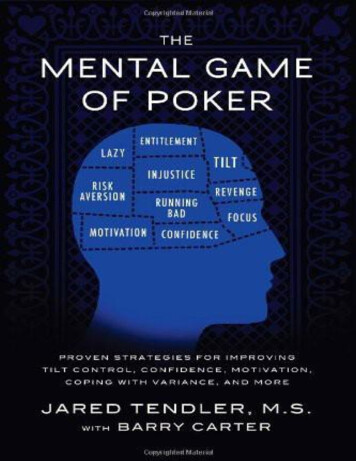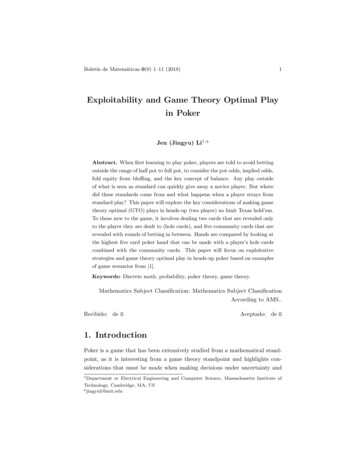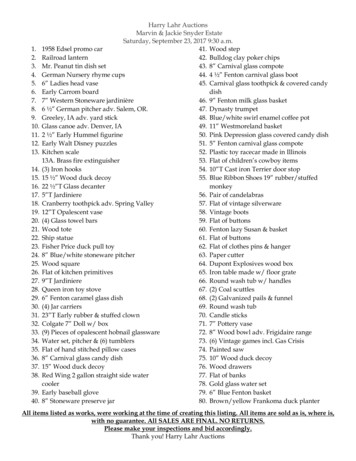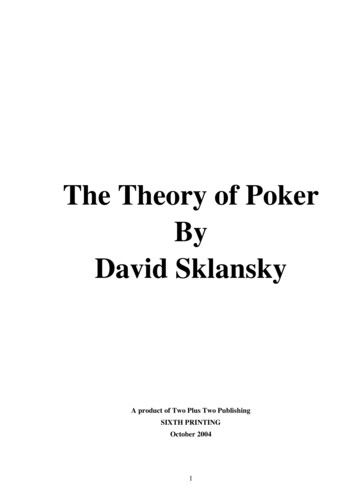
Transcription
f: iiv* lijlnnu M.IIHIL-HTHEMENTAL GAMEOF POKERENT3TJ FUENTLA71TIH VE INRE'JFNGtFOCUSCDHF IDEHCES TR ATE G-LE 5 FORIMPROVINGTILT CONTROL, CONFIDENCE. MOT VATION,ctjfiwt *ITH VARIANCEANQ MlJCiEJARED TENDLER, MSWITHBARRY CARTERU-fxyi lul'lhri rj. iHi\ g(
Praise for Jared Tendler’s Coaching“He has been such an enormous help to me. I now play virtually tilt-free and bring myA-game nearly every time I play.”– Dusty “Leatherass” Schmidt, PokerStars Team Online ProAuthor of Don’t Listen to Phil Hellmuth and Treat Your Poker Like a Business“I think I’ve been one of the most successful online players over the past five years,and there’s been no greater positive influence on my game than Jared and nothing elseeven comes close.”– Niman “Samoleus” Kenkre, BlueFire Poker Coach“Jared has helped me develop strategies to better manage my approach to poker andbusiness. If you are having issues with the mental side of your poker game, Irecommend Jared’s services.”– Taylor Caby, Co-founder of Cardrunners“Until Jared, the only advice I had heard about tilt, even from respected coaches, was‘don’t do it.’ Now I’m winning almost 12bb/100 playing stakes as high as 50/ 100Heads Up NL.”– Liz “RikJamesB1atch” Herrera“Jared invented the field as far as I’m concerned.”– Jesse May, The Voice of Poker“Jared Tendler is a pioneer of the poker mental game. No one else even compares tohis fact-based, scientific approach that is backed up by years of study in modernpsychology. This book is the first of its kind and should be considered mandatoryreading for any poker player.”– Hunter Bick, Professional Poker Player, Drag The Bar CEO“Tilt? Jared Tendler extends his arm and casually flicks a middle finger at it.”– Jon Young, Editor of WPT Magazine“Jared is a genius when it comes to helping you both recognize and systematically ridyourself of the issues that are getting in the way of reaching your potential. I don’tknow where I would be today without him.”– Danny Steinberg, High Stakes Professional“I’ve met quite a few people in this field and no one has had the effect that Jared did.”
– Sean Gibson, Poker News Daily“I can honestly say that working with Jared is one of the best investments I’ve evermade.”– Matt “mbolt1” Bolt, DragTheBar Coach“Jared’s approach works very well because he doesn’t put a patch on the problem andinstead changes the way you think, not just about poker but life in general.”– Pascal “Stake Monster” Tremblay, Cardrunners Coach“Jared is a smart, hard-working, funny guy who is extremely good at his job. Hemanages to be both personal and professional, which is a hard thing to do. If you havetilt issues that cost you money, then you’re downright silly not to work with him.”– Paul “GiantBuddha” Hoppe, DragTheBar CoachAuthor of Way of the Poker Warrior“He teaches you things you simply can’t learn by playing.”– Ben “NeverScaredB” Wilinofsky, Winner 2011 EPT Berlin“I worked with Jared for three months and my progress was nothing short ofphenomenal.”– Alan “Dixon” Jackson, BlueFire Poker Coach
THEMENTAL GAMEOF POKER
The Mental Game of Poker: Proven Strategies for Improving Tilt Control,Confidence, Motivation, Coping with Variance, and MoreCopyright 2011 Jared Tendler, LLCAll rights reserved. No part of this book may be reproduced or transmitted in any form or by any means, withoutwritten permission from the author, except for the inclusion of brief quotations in a review. To request permission touse any part of this book in any way, write to: jared@jaredtendlergolf.com.Published by Jared Tendler, LLCPrinted in the United States of AmericaISBN 978-0-983-95971-7Cover and book design by theBookDesigners www.bookdesigners.comJared’s headshot courtesy of Naheed Choudhrywww.jaredtendlerpoker.comDigital book(s) (epub and mobi) produced by: Kimberly A. Hitchens, hitch@booknook.biz
THEMENTAL GAMEOF POKERAii ENTIIIEMENT VLA Ilf !iHjusricERIHAVHSIDH.—kTILT!i-'iRi VIHGE1" RUNN.'NG -VVm*I; WOTlWIQH ! tOH FEDEHCF:rfocus**ÿi\PROVEN STRATEGIES FOR IMPROVINGTILT CONTROL, CONFIDENCE, MOTIVATION,COPING WITH VARIANCE, AND MOREJARED TENDLER, M.S.WITHBARRY CARTER
ACKNOWLEDGEMENTSI’ve been fiercely independent throughout my life, so when I first set out to write thisbook, I thought I could do it on my own. I was overconfident (chapter 8). If not for thefollowing people, this book would not have become a reality.I’d like to thank Barry Carter, co-author, for helping turn my ideas and experience intosomething that would make sense to poker players. As a poker journalist, pokerplayer, and one of the best people I know, Barry forced me to be clearer and moredetailed when making a point. His enthusiasm and patience pushed me to write a betterbook, one that I am proud to include both of our names on. Although the originalmaterial for this book was not Barry’s, his contribution was invaluable, and he made ithis own. He was the perfect person to help me write the book I envisioned.I’d like to thank my clients for sharing their stories for this book: Dusty Schmidt,Niman Kenkre, Liz Herrera, Matt Bolt, Jordan Morgan, Mike Song, Pascal Tremblay,and Sean Gibson. Your honesty and willingness to share your stories ultimatelybrought this book to life.I’m also extremely grateful to all of my clients for giving me the opportunity to refinemy method and techniques. In particular, Dusty Schmidt, my first poker client, whohelped me understand the nuances of high-level poker, introduced me to the pokercommunity, and translated my work from golf to poker.There are a number of pioneers, such as Dr. Alan Schoonmaker, Tommy Angelo, andMatthew Hilger, who solidified the place of psychology in poker. They advanced thefield and made it far easier for poker players to accept the importance of the mentalgame.Without the love and ongoing support of my parents, sister, and brother-in-law, thisbook may never have been written. Thank you for always encouraging me to pursue mydreams, helping me persevere when it was tough, laughing at me for taking so long,and still thinking I could do it.Thank you Corey Karsch for believing in me, lending your expert writing skills, andmaking the greatest accomplishment of my life more fun.Thank you Alexis Nahoum for generously giving of your time – no questions asked.You went above and beyond, and really stepped up when I needed you. You trulyhelped to lighten the load, and your support and expertise were invaluable. I will be
forever grateful.A number of friends and family members also spent hours reviewing portions of thisbook: Jay Kotlen, Sue Kotlen, Ronit Glantz, Melissa Nagin, Ben Nagin, PaulBacanovic, Sharon Hirshick, Andy Hirshick, and Kyra Karsch. Thank you for givingup your days, nights, and weekends to make this book easier for others to read.Thank you David Horne, Scott Brown, Evan Rothman, Hunter Bick, PokerNews,Diana Murphy, Jake Poinier, and Tyler Kirkendoll. For a variety of reasons, youhelped make this book happen.
1 INTRODUCTIONGolf Sets the StageEnter PokerClient’s Story: Dusty “Leatherass” SchmidtI’m Not a Poker PlayerThe Problem with Conventional Poker PsychologyMental Game FishMental Game StrategyMental Game MythsHow to Use This Book2 FOUNDATIONThe Adult Learning ModelSidebar: Flaws are SkillsInchwormClient’s Story: Niman “Samoleus” KenkreTwo Common Learning MistakesThe Process ModelPreparation/Warm-upClient’s Story: Dusty “Leatherass” SchmidtPerformanceResultsSidebar: Results-oriented ThinkingEvaluationClient’s Story: Niman “Samoleus” KenkreAnalysisUse the Process Model Every Day3 EMOTIONResolutionMalfunctioning MindTwo Causes of EmotionAccumulated EmotionSpectrum of EmotionPerformance and Emotion4 STRATEGYInjecting Logic1. Recognition
2. Deep Breath3. Injecting Logic4. Strategic Reminder5. Repeat as Necessary6. QuittingResolutionMental Hand HistorySidebar: Correcting Flaws in PokerSidebar: The Mental Side of Poker MistakesAdditional StrategiesTracking ImprovementWritingAccumulated EmotionConclusion5 TILTTilt Anger Bad PlayThe Nature of AngerAccumulated TiltThe Tilt of TiltThe Benefit of TiltWinner’s TiltTilt ProfileSidebar: Think You Don’t Tilt?Seven Types of TiltBarry’s Take: Understanding your Opponents’ TiltGeneral Strategy for TiltClient’s Story: Liz “RikJamesB1atch” HerreraWhat Progress Looks Like and How to Keep it GoingRunning Bad TiltClient’s Story: Matt “mbolt1” BoltFocused More on Results than QualityBooking a WinPoker/Life BalancePredicting Bad BeatsResetting Your MindInjustice TiltSidebar: Assuming You’re BetterTerrible at Spotting Good VarianceMore Than is Fair
Injustice Tilt OpportunityWishing Poker Wasn’t This WayDesire to Control VarianceAn Excuse Not to LearnClient’s Story: Barry CarterBad Beat StoriesJealousyHate-losing TiltCompetitivenessMoney LostClient’s Story: Jordan “iMsoLucky0” MorganBelieving You Can Win Every HandLost SkillLosing Gets PersonalLosing Hurts More Than Winning Feels GoodMistake TiltExpecting PerfectionWhen a Mistake is Not a MistakeObvious MistakesThreatens Your GoalsKnow Too Much, Mastered Too LittleEntitlement TiltOverconfidenceLosing to FishClient’s Story: Liz “RikJamesB1atch” HerreraLosing to RegularsClient’s Story: Mike “Syous” SongMoving Up in StakesRevenge TiltNo RespectFacing Constant AggressionPlayer with HistoryRegaining ConfidenceTaking Your MoneyEnacting RevengeYour Soul OwnedDesperation TiltSidebar: When Losing Feels GoodNon-negotiable Strategy
Using Tilt to Improve Your PlayKeeping Records6 FEARThe Nature of FearBarry’s Take: Be Fearless Like IveyIncomplete InformationFuel to PerformFear Profile1. Overthinking2. Not Trusting Your GutBarry’s Take: Feel Players3. Second-guessing4. Performance Anxiety5. Negative FutureGeneral Strategy for Resolving FearPlaying Out the FearAnswering QuestionsCommon FearsFear of FailureFear of SuccessFear of MistakesFear of a Bad RunClient’s Story: Pascal “Stake Monster” TremblayFear of Moving Up in StakesRisk AversionClient’s Story: Barry Carter7 MOTIVATIONThe Nature of MotivationInspirationBarry’s Take: Prop BetsStable MotivationCommon Motivational ProblemsLazinessProcrastinationRunning Good and BadBurnoutSidebar: Underestimating Stress
Goal ProblemsClient’s Story: Matt “mbolt1” BoltFreerolling Your TalentStop DreamingAbsence of LearningClient’s Story: Jordan “iMsoLucky0” MorganNumb to EmotionHopeless8 CONFIDENCEThe Nature of ConfidenceStable ConfidenceUnder-confident and OverconfidentDeveloping Stable ConfidenceThe Skill of Recognizing VarianceThe Skill of Recognizing Your SkillThe Skill of Recognizing Your Opponents’ SkillBarry’s Take: Defining Your EdgeIllusion of ControlClient’s Story: Matt “mbolt1” BoltIllusion of PermanenceIllusion of LearningWishingClient’s Story: Sean GibsonConclusionYou Have Not Mastered This BookAppendix IWarm-up and Cool-downAppendix IIClient Questionnaire
1INTRODUCTIONin the mental game of poker use a strategy that’s provento work for them. They have a structure and methodology in how they approach themental game, and don’t need to rely on a lucky rabbit’s foot or praying to the pokergods.PLAYERS WHO ARE SUCCESSFULIf there were no way to control whether you play in “the zone” or go on tilt, my workas a mental game coach would be nothing more than blowing smoke up your ass.Tilting and playing your best happen for predictable reasons and occur in predictablepatterns. As a poker player, you profit from your ability to analyze the patterns andhabits of your opponents. Using the tools provided in this book, you will develop theability to study the patterns and habits in your own mental game.The fact that so many players have benefited from working on their mental game,whether from my advice or others’, is proof that success in the mental game comesdown to skill, as poker does. However, many players think tilt, fear, motivation, andconfidence happen for random, illogical, or irrational reasons. As a result, they say orthink the following:“Logically, I know variance happens, so it’s stupid to tilt from a bad beat.”“For some reason, I decided to play like a donkey last night.”“I’m running really bad; maybe I should take a break.”“I always play my best game on Full Tilt.”“After being up big, I somehow manage to spew off a few stacks.”“I wish I could play as well as I did today, all the time.”If you think the mental game is random, you simply lack the skill to see how it’spredictable and rational.Skilled poker players are easily able to see how the actions of weaker opponentsaren’t random. They pick up on betting patterns, timing tells, physical tells, and verbaltells, which allows them to exploit the games of weaker players. Weaker players don’thave the skill to see the predictability in their game. The same is true in the mentalgame. Right now, you probably don’t have the skill to recognize the actions, thoughts,
and emotions that lead you to play your best or worst. That makes you a mental gamefish. Thankfully, you were able to evolve from being a poker fish—and with the rightinformation you can do the same with your mental game.With poker more competitive than ever, more players are turning to the mental game asa valuable way to create an edge. Creating edge is not a new idea of course; it has justbecome more important in poker over the past several years, as the number of qualitypoker players has risen dramatically. Thanks to websites such as 2 2, Cardrunners,and others, the way the game is played has changed forever. Now, with the playerpool so deep, parts of the game that weren’t taken so seriously even just a few yearsago, such as the mental game, are now a necessity.Golf Sets the StageAthletes in all the major sports face the same challenge to stay ahead of theircompetition. While it’s rare that a sport evolves as quickly as poker has, professionalgolfers recently went through something similar when Tiger Woods took the golfworld by storm in the late 1990s. As he swept through the professional ranks, hebrought a new set
field and made it far easier for poker players to accept the importance of the mental game. Without the love and ongoing support of my parents, sister, and brother-in-law, this book may never have been written. Thank you for always encouraging me to pursue my dreams, helping me persevere when it was tough, laughing at me for taking so long, and still thinking I could do it. Thank you Corey .











